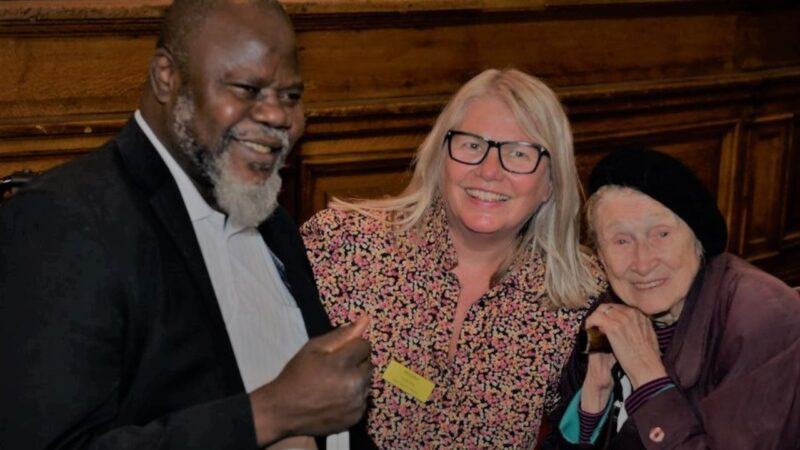Wandsworth resident Ray* was referred to London sight loss charity, BlindAid in 2021. An elderly man, he had recently been registered blind but had no family close by – his only relative was in Australia.
BlindAid sight support worker for Wandsworth, Fiona (main picture, right), began regular contact with Ray, calling him during the pandemic then visiting him at home. Ray loved reading, something he had missed since losing his sight, so Fiona set him up with the Royal National Institute of Blind People (RNIB) talking book service.
More immediately, Fiona responded quickly after Ray had a fall, getting him medical attention. She also arranged support from the council’s occupational therapy and sensory teams, which got him the tools to stay independent – a talking microwave, for example.
Being isolated at home, one thing Ray missed was the chance to talk his native Cantonese. Fiona found him a volunteer who could go on walks with him, chatting in the language.
Sadly, Ray became terminally ill and moved to a hospice, where he died earlier this year. Up until his last few days, Fiona continued to spend time with him, bringing his favourite mango drinks and making sure he did not feel alone.
Ray’s story illustrates perfectly the positive impact that BlindAid’s sight support workers have on the lives of their clients. The oldest sight loss charity in London, BlindAid was founded in 1834. Today it works with people across inner London, including Wandsworth, which has the eighth highest rates of registered sight impairment in the capital.
We work with a person for as long as we are needed, providing all kinds of support and helping them engage with services.”
According to Richie Walden, BlindAid’s operations director: “When people think of sight loss, they often imagine someone out and about with a guide dog. However, we are there for those people who really do feel trapped behind closed doors, the ones who don’t get out.
“We work with a person for as long as we are needed, providing all kinds of support and helping them engage with services. For our younger clients, it’s about helping them to independence. However, many of the people we work with are over 70, often with complex health needs, so we maintain that support. Our sight support workers are paid roles, not volunteers, so we can give that commitment, to being there when people need us.”
It’s a joy to see someone begin to feel more confident and less isolated.”
For Fiona, one of the best things about the job is the diversity of the role. No two visits are the same as she offers very personalised support for each person living with sight loss.
“It’s an important role,” she says. “We can support the person in their home after a diagnosis of sight loss. They may not be aware of the support available in the community and feel very alone as quite often they may have no family or anyone visiting them apart from us. We can be the link to more support at home and the community. It’s a joy to see someone begin to feel more confident and less isolated.”
In October 2022 the charity received £32,000 health inequalities grant from NHS South West London, which funds Fiona’s post in Wandsworth. A second grant for the same value followed in April and is paying for an additional sight support worker for the borough, boosting the charity’s capacity by 100% and helping it work with around 200 Wandsworth residents a year.
Unequal access to healthcare is a big issue for people with sight loss, particularly those who live alone without local support. According to an RNIB survey, almost half of blind and partially sighted people feel moderately or completely cut off from the world around them, with limited access to activities. Unsurprisingly, sight loss can increase the risk of depression. Yet few people receive emotional support in relation to their deteriorating vision.
People with visual impairment are more susceptible to falls, leading to broken bones and hip problems. Medical issues can also be made worse by the difficulty of arranging and getting to appointments. So, helping people stay on top of hospital visits and book transport is a key role.
Our sight support workers approach each visit in a unique way. Some people just want social contact, others have a specific concern.”
Says Richie: “Our sight support workers approach each visit in a unique way. Some people just want social contact, others have a specific concern – needing a referral to sight services or to get a GP appointment, for example. A lot of older visually impaired people also struggle getting to grips with technology and digital systems and services. People have a wide range of needs, and we make the right connections, helping with housing issues and utility companies, as well as the NHS. But our real aim is to reduce social isolation.”
Richie added: “We know there are a lot of people with sight loss in Wandsworth, and these figures only relate to those who are registered, which many choose not to do. We are feeling the increase in demand for our service, so it’s been particularly wonderful to have NHS funding to bring on board another worker.”
Photo: Fiona (centre) with service users
*Not his real name.
